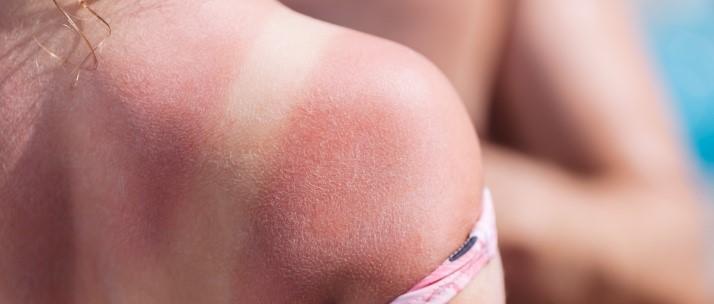
Why are men less likely to wear sun cream?
Peer reviewed by Dr Sarah Jarvis MBE, FRCGPLast updated by Milly EvansLast updated 22 Aug 2019
Meets Patient’s editorial guidelines
- DownloadDownload
- Share
- Language
- Discussion
By now, health promotion campaigns have made most people aware of the importance of protecting their skin from the sun. Yet a significant portion of the population still doesn't use sunscreen on sunny days, and the majority of culprits are men.
In this article:
Sunscreen is a word that is both feared and revered in the beauty industry. For many, it is synonymous with good skincare and anti-ageing. Many women have built SPF into their daily skincare routines. But the same cannot be said for men, who are far less likely to protect their skin from the sun. Even on sunny days, 31% of men are likely not to use any sun protection, compared to just 15% of women who would go without.
A study in the US showed that only 51% of men had used sun cream in the last year. In the same study, 70% admitted not knowing the signs and symptoms of skin cancer. Other surveys have shown that 50% more men than women forget to protect their skin and 75% more aren't worried about getting sunburnt. Even after having melanoma, the most serious type of skin cancer, one study found that men were consistently less likely to take measures to prevent sun exposure to avoid future cancer.
Continue reading below
Do men get skin cancer?
Despite much of the advertising for sun cream and skin cancer campaigns targeting women, 50% of cases of skin cancer are in men, making it the fifth most common cancer. In fact, skin cancer in men is on the rise, increasing by 55% over the last decade compared to by 35% in women.
Whilst men are as likely to be diagnosed with skin cancer, it can affect them in different ways, explains Dr Anjali Mahto, dermatologist, author of The Skincare Bible and spokesperson for the British Skin Foundation. "Body sites can be quite different. For men the commonest site for melanoma, which is the skin cancer that we particularly worry about, tends to be the back, but in women it tends to be the back of the legs. So there is a distribution issue where things can be different."
Although there is no proven reason for this difference, there could be links between sun safety behaviour and location of melanomas. "One of the theories is that it's about exposure. Melanoma is often associated with intermittent but high-intensity sun exposure." This can be when someone who doesn't usually get much sun goes on holiday to a sunny place and ends up with sunburn. "Guys will go shirtless or topless and that could be a reason why the back is more commonly affected."
According to Cancer Research UK, men in the UK are also considerably more likely than women to die from skin cancer. 59% of all melanoma skin cancer deaths in the UK are in men and 41% in women. Researchers believe that this may be due to the differences in male and female skin including that men have thicker skin with less fat underneath, and skin containing more collagen and elastin which keep the skin firm and tight.
Georgina Hill, health information officer at Cancer Research UK, explained that a lack of awareness could also be affecting the stage at which we catch skin cancer. "There are various things that could mean men are more likely to die from skin cancer, such as being diagnosed at a later stage," she said.
But the demographic of the population and the aesthetic desire for a tan are also to blame for a growing number of skin cancer cases, and thus more deaths, according to Hill.
"More people taking action when noticing changes to their skin and the fact that people are living longer - cancer is more common as we get older - can also explain rising rates. But most cases of skin cancer are caused by too much sun, and people may be putting themselves at risk by chasing a tan."
Do I need to wear sunscreen?
Back to contents"Sunscreen is a part of your healthy sun-seeking behaviour," says Mahto. "Sunscreen, along with a hat, sunglasses, protective clothing, staying in the shade, sitting underneath an umbrella - all of those things will reduce your risk of sunburn."
So why is sunburn so bad for you? "If you have multiple sunburns, that is direct damage to the DNA in your skin cells and it can promote skin cancer. So wearing SPF from a medical point of view is to reduce the risk of developing skin cancer further down the line."
Some people dismiss or ignore their own risk of skin cancer, especially if their sunburn tends to develop into a tan. But the sun affects your skin in more ways than one, says Mahto.
"If you can't appeal to people from a medical point of view then you can appeal from a vanity point of view. About 80-90% of the signs that we associate with skin ageing - lines, wrinkles, pigmentation, sagging - occur because of the sun. So if you wear sunscreen and you wear it regularly, you are going to slow down that ageing process of the skin as well."
"To protect yourself, ditch sunbeds and enjoy the sun safely by seeking shade, covering up with clothing and regularly reapplying sunscreen on parts that aren't covered up," says Hill.
Being aware of skin cancer and its signs and symptoms can also help to prevent later diagnoses as well.
"Getting to know what your skin normally looks and feels like is important for everyone, and can help you spot skin cancer early, when treatment is much more likely to work. Things like a spot or sore that looks unusual or won't go away could be a symptom - and even if it's not cancer, it's best to get any changes checked out."
Continue reading below
Why aren't men using sun cream?
Back to contents"Public education is always the big thing," explains Mahto. He worries that men aren't being encouraged to protect their skin from the sun and aren't being warned about the dangers of sun damage as much as women.
"It's actually recognising that men are also at risk of skin cancer. Making more information available in the men's press. In women's magazines it gets to the spring/summertime and nearly every other article is going to be about sunscreen and SPF. It would be great if men's magazines started doing something similar as well."
There are various issues which make men less likely to use sunscreen, according to Mahto. In many cases, it's simply a matter of not being used to including skincare, and particularly sun protection, in their daily routines.
"I think women are more used to using skincare products. We're almost indoctrinated from a fairly young age that we should be using them; guys just aren’t. Trying to get men to use a sunscreen in general can be a challenge," she says. "Some men will start getting better at using sunscreen after they have children and use their children's sunscreen when applying it on them."
In a few cases, the association of skincare with cosmetics and femininity clashes with ideas of masculinity.
"There's a group of men who still have this idea that 'I don't need sunscreen', that I'm manly enough that it's not something that I need to be concerned about," says Mahto. Needless to say, masculinity alone isn't an effective sunblock. However, it's unsurprising that the regular use of SPF is associated with women rather than men, as sunscreen and skincare adverts tend to feature women and children and focus on protecting 'delicate' skin.
Many men understandably argue that they don't wear sunscreen because they don't like the way it feels on their skin.
"Because men tend to be a bit hairier, often the sunscreen can feel a bit sticky and it can get caught in the hairs. So often people don't like rubbing it in their beard hair, chest hair or back hair." Simply put, many men have different needs from their sunscreen than women.
In order to make using SPF more comfortable and thus making them more likely to continue protecting their skin from the sun, men need to find sunscreen formulations that they like and don’t mind the feeling of on their skin.
"It's about a little bit of trial and error for guys to actually try a few things out. A lot of men often prefer sprays rather than creams because they go on more easily so it's also about finding a texture or format of product that suits you better. That is going to come with a bit of trial and error not just stealing your partner or kids' sunscreen. Just go and see what's available."
Patient picks for Sun and sunburn

Skin, nail and hair health
How to treat sunburn blisters
Hot weather seems like the best time to soak up the sun, work on a tan or play outdoors. But warmth and heat can be dangerous. Sunburn can sometimes blister, causing pain and infection. What causes sunburn blisters? How do you treat them and should you really pop them?
by Victoria Raw

Skin, nail and hair health
Why it's so important to know your skin type this summer
Do you tan easily? Do you start to go pink as soon as you step out in the sun? Then take a look at the Fitzpatrick scale - a handy tool to assess your skin's sensitivity and help shield your body from burns this summer.
by Heather Ainsworth
Continue reading below
Article history
The information on this page is peer reviewed by qualified clinicians.
22 Aug 2019 | Latest version
22 Aug 2019 | Originally published

Ask, share, connect.
Browse discussions, ask questions, and share experiences across hundreds of health topics.

Feeling unwell?
Assess your symptoms online for free
Sign up to the Patient newsletter
Your weekly dose of clear, trustworthy health advice - written to help you feel informed, confident and in control.
By subscribing you accept our Privacy Policy. You can unsubscribe at any time. We never sell your data.